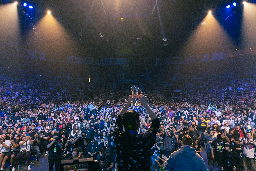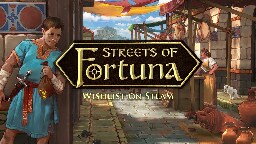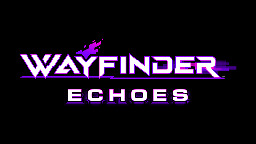Evo 2024 Competitors: By the Numbers






Gods Will Be Watching is the one that comes to mind for me. It's a strategy game of sorts with about 7 or 8 totally different scenarios where you're managing a very bad situation. In one, you're holding hostages while executing a heist, and in another you're wandering through a desert with limited resources. Each one is a balancing act, and a through line forms the narrative across them all. It was probably hamstrung by its punishing difficulty at launch, which was later addressed by additional difficulty modes, but there's a lot of room to iterate on this concept without it ever getting old.
They're not. This same curve happens with PvP games. The ones that don't follow this trend are the exception, not the rule.
It's a great game, but it's hard to argue that it didn't change the genre, and all of multiplayer video games, for the worse. Multiplayer games can no longer be designed to just be fun. They must also be addictive, they must retain players, they must keep them coming back, etc. using every manipulative trick in the book like XP bars and unlocks. You might say MMORPGs did this first, but this was the application of that feedback loop to a competitive action game.
She was credited with a pseudonym. It happened plenty in the 90s, and this wasn't long after. That means probably Hollywood talent. Someone prestigious who thought taking this role would be bad for her career, or maybe her agent thought that. But times have changed in the past 20 years, so maybe we can know who it is now.
But will they credit Eva's voice actor by her real name this time? Whatever stigma there may have been in 2004 for being in a video game has got to be gone by now.
There's also a new 3D factory game called Foundry. Having bounced off of Satisfactory, that one seems more promising as a fan of Factorio.



They iterated on a stale formula in a way that those customers had wanted. Palworld is also far more competently designed than you'd expect from its premise, but that premise is the kind of satire that only people familiar with Pokemon would write in the first place.
Better than the people giving it a bad review for difficulty, it would seem.
I just picked up Dread Delusion, Shadows of Doubt, and Stellar Tactics. I played demos of Dread Delusion and Shadows of Doubt a while back, and both of them blew me away; the former just launched out of early access and the latter is supposed to do so before the end of the year. Stellar Tactics is one that's intriguing, but I haven't played it yet. I've been playing Fallout 2 lately, and it made me want to find a CRPG that was more successful at what Starfield was trying to do; I typed in some tags into the Steam search, Stellar Tactics was what I found, and I think it'll scratch that itch. Stellar Tactics is also in early access, and it's been in early access since 2016 with no end in sight, but it's very systems driven, so I'll likely be okay with playing it early anyway.
Potentially true. Or it was an accident that proved more lucrative than they thought it would. At the very least, it got there first and showed everyone else how to ruin multiplayer games.


























Epic Games has been clear about seeing Steam as a direct competitor, and has done everything from giving away free games to paying for timed exclusives to entice players.
Yup, that's everything. Those are their only options. Yup. Nothing else to be done. It's an unsolvable problem if those things don't work.
This is supposed to be how competition in the marketplace works
In case the above sarcasm wasn't clear, no, this is not how competition in the marketplace is supposed to work.
If you want a preview of an uncaring and anti-consumer Valve, look no further than the company's efforts on Mac.
This is an example of Apple making life difficult for its customers, not Valve.
There's no excuse for Steam on Mac to be a far worse experience than on other platforms, though.
There is, because Apple wanted to control their entire hardware pipeline, which meant breaking compatibility with the entire history of PC gaming when they did so. If this is your smoking gun, author, try harder.
Eventually, the bomb will go off, and the full 'enshittification' of Steam will commence.
I hate this enshittification term so much, because all it means is that they got complacent, and competitors can pick up the slack. You just spend your money elsewhere, whether it's Xbox vs. PlayStation or Steam vs. GOG. It is a problem that Steam has so much control of the marketplace, but they got there because their competitors aren't truly competing. I finally found a reason to shop on GOG again, despite the fact that they don't support their Linux customers as well as their Windows customers, and definitely not as well as Valve treats them, but DRM-free is a compelling argument for me. Epic does not make a compelling argument for the consumer, which is why that meme, pasted in the middle of the article, exists.





Sinking ship or not, word was that Wizards' cut of BG3 was over $90M. $100M was the entire production cost of Baldur's Gate 3. If you could fund an entire other massive video game for the cost of what you paid your partner for licensing, I'm sure anyone would be rethinking that deal. At this point, they don't need the D&D license any more than BioWare needed the Star Wars license after KOTOR.
It just makes economic sense.
The data suggests a sharp shift in consumer behavior — far from the cable era, when viewers largely stuck with a single provider, as well as the early days of the so-called streaming wars, when people kept adding services without culling or jumping around.
Yeah, turns out when the monopolies are eliminated, people get more competition and a better deal on the consumer end. It's why I'll never understand people who say streaming services became as bad as cable.
One option for slowing the churn, executives think, is to bring back some element of the cable bundle by selling streaming services together. Executives believe consumers would be less inclined to cancel a package that offered services from multiple companies.
No, I'm less likely to cancel a service that's worth what you charge for it. Be happy you got one month out of me, and if you want more, offer me more value. Putting serialized shows out week by week doesn't do it for me either, because I'm just going to wait until the season is done to start watching it anyway.
Price sensitivity is also a factor. Americans with a streaming subscription are spending an average of $61 a month for four services, an increase from $48 a year ago, according to a new study by Deloitte. The increase was due to higher prices, not additional services. Nearly half the people surveyed said they would cancel their favorite streaming service if monthly prices went up another $5, the study said.
Mystery solved.
The budget for Starfield was twice that of Baldur's Gate 3. Throwing more money at it isn't going to do a lot if they're allocating it poorly.
games back then were also more focused on quality
This is selection bias. You remember Metal Gear Solid, but do you remember Iron & Blood: Warriors of Ravenloft? Do you remember Mortal Kombat Mythologies: Sub-Zero? Bubsy 3D? The million-and-one licensed games that were churned out like baseball cards back then?
and make gamers replay the game with unlockable features based on skills, not money
If we're going to say that a full-price game today costs $70, Metal Gear Solid would have cost the equivalent of $95. Not only that, but that was very much the Blockbuster and strategy guide era. Games would often have one of their best levels up front so that you can see what makes the game good, but then level 2 or 3 would hit a huge difficulty spike...just enough to make you have to rent the game multiple times or to cave in and buy it when you couldn't beat it in a weekend. Or you'd have something like Final Fantasy VII, which I just finished for the first time recently, and let me tell you: games that big were designed to sell strategy guides (or hint hotlines) as a revenue stream. There would be some esoteric riddle, or some obscure corner of the map that you need to happen upon in order to progress the game forward. The business model always, at every step of the medium's history, affects the game design.
"Value" is going to be a very subjective thing, but for better or worse, the equivalent game today is far more packed full of "stuff" to do, even when you discount the ones that get there just by adding grinding. There are things I miss about the old days too, but try to keep it in perspective.
Is it perhaps a slow, laggy mess because Apple decided to break from the same convention that everyone else uses and has used for decades and now has to emulate a different processor architecture? Apple is the one who made gaming shittier on Macs, and they're going to point to Death Stranding and Resident Evil 4, expecting the flood gates to be open, and now everyone's going to port their games to Mac. Except they're not. Apple won't understand why not, but once again, as they've always done, breaking from convention and establishing your own standard that doesn't play nice with what everyone else is building around is bad for developers. Before this, they were still making developers' lives harder by not supporting certain graphics APIs. Valve made a Vulkan translation layer to Apple's Metal, since Apple wouldn't officially allow for Vulkan, and that was shortly before the architecture change.
It is an excuse for Valve, because their business is selling thousands of games that do not have ARM-native builds. No action of Valve's made Steam worse for Mac users. An action of Apple's did that. At some point, it's not worth it for Valve to update their application to be better for a platform that's actively hostile to its business partners.
Of the ones I've played, Elden Ring. The biggest aid for new players being that if something's too tough, you just go somewhere easier and come back later. The opening area has a boss roaming a field designed to teach you exactly that lesson.
Glad to hear they're doing the smart thing and listening to what people want. Invasions sound cool on paper, but they end up just being annoying, and you design how you play around avoiding them. It's cool to summon people from their summon signs, but it would just inherently work better if you could choose people from a damn menu, including your friends.
So Redfall was set up to fail, and you make those people fall on the sword, and then Hi-Fi Rush is a game people clearly want more of and could have stood to cost more than $30, and you let those people go too instead of hitting the ground running on a sequel? What is wrong with you, Microsoft?
Why does this response just feel like it's a restatement of what people already have the right to without addressing if they're taking any action or not? Their mobile phone example even remains usable, whereas a lot of these games do not.
Judging by how Sony is doing even though they clearly "won" with the PS5, it looks like consoles as we know them are not long for this world, and that seems to be the idea Microsoft is pivoting around.
Sure, but like...would it really be the end of the world if it got controller support? I'm far more comfortable on controller than I am on mouse and keyboard, largely because I work on mouse and keyboard all day.
There was an article from years back, I want to say around 2019 or so on then-Gamasutra, about how it was already too late to stop the bubble from bursting because all of these games are trying to get everyone's attention (I'm having trouble finding it now). Now the bubble is bursting, and big games these days have dev cycles of about 5 years, putting us right here in 2024. Get dev cycles to 3 years or less so that you can actually react to changing market conditions, and charge a fair price for a good product. Maybe sequel it or otherwise make regular old expansion DLC. That was sustainable. No one even makes a multiplayer game anymore unless it's intended to be rigorously competitively balanced or suck up all of your time and money through grinding.
They sell you a product at a fair price without putting it behind a loot box, unless I missed something. I don't think that makes Paradox "just as bad" because they make a lot of DLC that you could choose to not purchase.
There is if they're interested in competing with Steam. Epic made some very competitive offerings for the supply side of things and then provided very little reason for customers to ever shop there, which it turns out is just as, if not more important.
Hopefully the last game Id makes before Microsoft closes them is a good one.
It highlights the crucial flaw with Tekken for me: you have to just memorize how to defend everything your opponents can do to you rather than being able to intuit it on the fly. Which moves hit high/medium/low/overhead or track horizontally? There's no language to it; it's just done on a per move basis for balancing reasons, which means it would take me forever to get to the part where I actually get to think and play the game. This string, mashing 3, has highs, mediums, and lows all built in, plus it low profiles some counter attacks from opponents. This bot would beat me, too.
Personally, I think I'd rather not even give them the word of mouth of having played their game. There's so much out there to play, and plenty of it doesn't come from a company doing lousy stuff like this, even if it's second hand.
We know the answers to this. First, we got Half-Life: Alyx, which is a phenomenal Half-Life game that happens to be a VR game. Slight spoilers, but to say that Half-Life 3 is promised at the end of that game is an understatement.
Second, if you've already played Alyx, Keighley put out The Final Hours of Half-Life: Alyx, which has a full timeline of everything they worked on since Portal 2, including cancelled games. One of those games was Half-Life 3. It would have been a game with procedurally generated levels interspersed with static set pieces, which sounds similar to a single player version of that game The Crossing they were working on. If you ask me, that design makes plenty of sense for putting a bow on a series with a time- and space-hopping protagonist in a series that always ends with cliffhangers. It didn't come together though, so it got cancelled.
Alyx was put together in part because letting all of their employees dictate their own projects was not getting the same results that it used to, so there was a bit more direction with the project than Valve had had in the years prior.
Remember to support games with LAN, folks.
They did though. Tencent had like a 30% stake in either BG3 or the company.
EDIT: As seen here.
If a little extra jiggle was crucial to the vision, then I'd say they need a better vision, but that's just me. The commentary I heard around this case in particular is that ratings boards around the world impose a ton of different criteria, and getting around all of them is no easy feat, so that could be to blame.
Being after well received titles is congruent with their Game Pass strategy. Being after as much money as possible would mean they probably should have charged more than $30 for one of the best games of the year.
The worst:
These companies piss me off, but...:
Embracer's pretty low on the "piss me off, but..." list. They made a horrible gambler's bet and were surprised to have to pay the bill later, and they do have a few live service games in the bunch too, but outside of that, what they were going for is something I really wanted to see succeed. The big publishers stopped making a lot of types of games that they used to make as they honed in on a select few money makers, and Embracer was picking up old, discarded, forgotten properties or subgenres and trying to show that there can still be a market for those. The fact that the bet has failed could be up to their execution, since as Keighley reminded us at SGF, customers do in fact respond when the right games show up outside of those AAA publishers, and Embracer had a vision. They pursued that vision irresponsibly.
It's DRM to authenticate your install. Also not a new thing, but still not great.
The industry historically hasn't shrunk when studios close like this. There just ends up being more bespoke studios all over the world with former developers from those studios.
Ads in Windows 10 back in like 2017 were major contributing factors for me to switch back then. But then when I mentioned I got ads in Windows 10, people looked at me like I had two heads. Perhaps there was some kind of A/B testing going on, and I was the unlucky one. This followed a forced update from Windows 8 Professional to Windows 10 Home, so I lost some control over my PC in that transition, as they took Pro features away from me.
Incorporates 3rd-party DRM: EA on-line activation and Origin client software installation and background use required.
You might be able to hack your way around this, but this prevented me from playing Jedi: Fallen Order on a train on a Steam Deck. Buyer beware. Dragon Age: Origins is on GOG.









It's on GOG. Currently on sale for $3. It's the non-remastered version, but I doubt that will hold people back much.